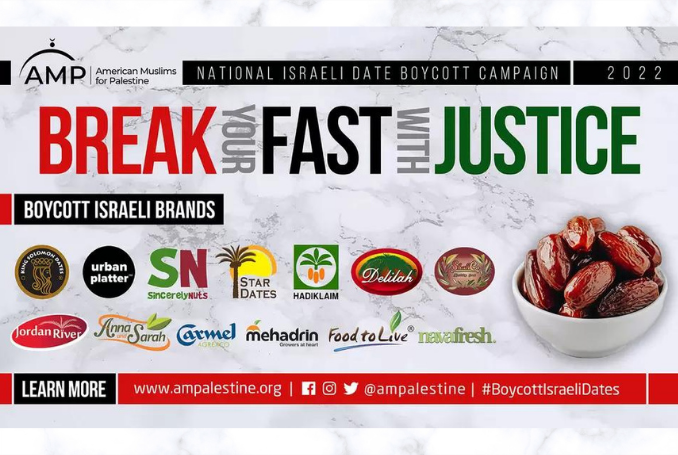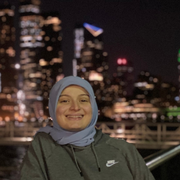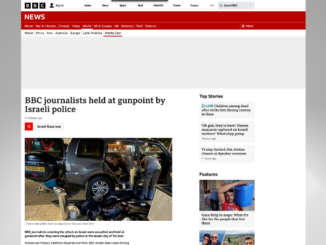
By Hafsa Habehh
The date is a sweet, nourishing treat. Who would think that this cultural and religious favorite would be a factor of exploitation, oppression, and occupation?
Dates are a staple in a majority of Arab and Muslim households and have become trendy as of late due to their nutritious and delicious properties. The global date industry was valued above 13.4 billion US Dollars in 2019 and is expected to grow by 21% by 2025. Within the top 5 exported date industries is Israel’s date industry, which exports over 140,000 tons worldwide. Consumers enjoy these dates, one after another, but at what cost?
It’s no secret that Israel’s date industry is dependent on exploitation, theft, and abuse. The state of Israel continuously annexes Palestinian land in the West Bank to build settlements, and despite the illegality of this practice, the rate of settlement building only multiplies. These illegally annexed enclaves of land happen to be where a majority of these dates are being produced. According to Al-Monitor, 40% of Israel’s date corporations operate on illegal settlements in the West Bank, such as those within the Jordan Valley.
The Israeli date industry not only operates by stealing Palestinian land, but it steals and diverts the resources that the land holds. The Palestinian date industry thus suffers at the expense of Israeli agricultural corporations due to the continuous theft of basic resources. Water, an essential component to any successful operation, is continuously stolen and diverted to Israeli plantations.
A 2017 report by Amnesty International states that 180 Palestinian communities in the West Bank have no access to running water. This unethical diversion of vital resources does not only affect irrigation but also strips Palestinians of a basic necessity required for everyday life.
Furthermore, this industry is notorious for its exploitation of Palestinian workers and violations of labor rights. Palestinians often have no choice but to work on these farms because the Israeli occupation has crippled the Palestinian economy. Naturally, because they have no other choice but to work on these date farms, they’re an easy target for exploitation.
hese workers endure grueling labor, under extreme temperatures for extended periods of time, being forced to climb dangerous heights for harvest, with lack of safety standards or regulation. To top it off, they’re grossly underpaid. According to Human Rights Watch, workers toil over 40 hours a week, with others exceeding 60 hours, whilst making not so much as 19 dollars a day. Without documents like “contracts, pay slips, permits, or any other [legal] documents”, workers are not provided any rights or protections afforded under Israeli labor laws, and are thus unable to sustain their families.
The ceaseless violation of labor rights and international law extends to the hiring of Palestinian workers for this hazardous work under the internationally legal age of 18. Reports show that children are often employed in these plantations and even take up more of the workforce than adults. The struggles Palestinians are enduring due to a crumbling economy, and the incessantly increasing poverty rates, are bound to lead children to dangerous work such as that of the plantations.
The abuse is straining their physical health with immediate and long-term effects that may hinder day-to-day activities for life. One child that worked there since he was 14 years old says: “I have a lot of back pain”. Children are pushed into this dangerous and tiresome labor by necessity and are subsequently abused by plantation management. The Human Rights Watch report says: “Knowing that families rely on the work, Israeli settler employers exploit Palestinian workers, including children, while Israel turns a blind eye”.
Injustices and abuse against Palestinians, big and small, all for us to enjoy a date. Is that worth it? While the international courts, Palestinian advocates, and lawyers handle the legal aspect of this issue, it’s time for us to take some action as consumers.
It’s time to boycott Israeli dates. In Ramadan 2012, American Muslims for Palestine (AMP) initiated a nationwide boycott of Israeli dates which sought to mobilize consumers and store owners to halt their sales and purchases of Israeli dates. Since then, the campaign has expanded its reach by incorporating nine AMP chapters throughout the states, who have engaged store owners, organizations, and distributed physical and digital materials to widespread community institutions.
As demonstrated in the past with the boycott movement against Apartheid South Africa, boycotts are a nonviolent form of protest that force an issue to be addressed when other mechanisms fail. We have even seen the results of this boycott taking effect. According to recent data from the US Department of Agriculture, the amount of dates imported from Israel decreased by more than 6.2 million pounds between the market year 2019 to 2020. At the end of 2020, they only imported 1.2 million pounds. Some may attribute this to the economic effects of the pandemic, however, in the 2021 market year, the US imported less than 2.4 million pounds of dates, which is still a 5.4 million pound decrease from the 2019 market year.
This Ramadan, when Muslims all around the world are purchasing dates, we must be diligent; for around 30% of the world’s Medjool trees are Israeli. Large Israeli date companies also purposefully deceive consumers by falsifying package labels to say ‘Made in the West Bank’ along with other forms of misinformation. Hadiklaim is one of the corporations that commit this fraud, with brands that include, but are not limited to, Jordan River, King Solomon, and Delilah.
Others to avoid are Mehadrin and Carmel Agrexco brands or boxes with those corporations. This year AMP has updated their list to add corporations like Star Dates, Urban Platter, NavaFresh, Anna and Sarah, Shah Co., and Sincerely Nuts to the boycott. Fortunately enough, for each of these brands to boycott, there are plenty more alternative brands, with varieties from Tunisia, Algeria, Egypt and even California.
This year, please do your part to end the occupation, apartheid, and abuse of Palestinian people. Our money is an essential form of resistance against the settler-colonial state. We are witnessing the international community jump to the movement of boycotting Russia for its recent attacks against Ukraine. This same action can and should be taken against the Israeli occupation for their 73-year long apartheid on Palestine.

– Hafsa Habehh graduated from Rutgers University Newark and was an organizer with Students for Justice in Palestine during her time there. She currently works as a research assistant and an educator with a focus on early childhood development. She is also an organizer with the American Muslims for Palestine — New Jersey chapter. She contributed this article to The Palestine Chronicle.







